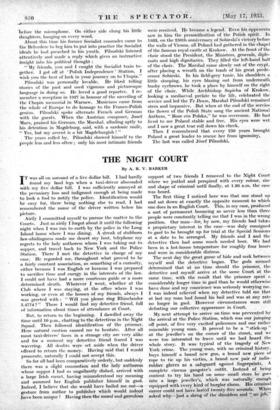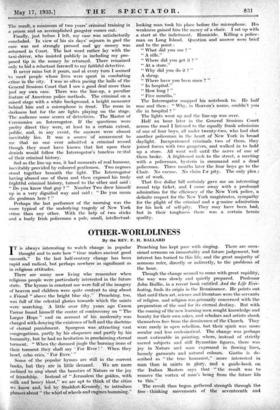THE NIGHT COURT By A. R. V. BARKER I T was
all on account of a five dollar bill. I had hardly found my land legs when a taxi-driver absconded with 'My five 'dollar bill. I was sufficiently annoyed at the pecuniary loss and indignant enough at being made to look a fool to notify the police. identification would be easy for, there being nothing else to read, I had remembered the name of the driver written below his- picture.
Airily I committed myself to pursue the matter to the. Courts. Just as airily I forgot about it until the following night when I was run to earth by the police in the Long Island home where I was dining. A streak of stubborn law-abidingness. made me desert my host, telephone my regrets to the lady authoress whom I was taking out to- supper, and travel back to New. York and the Police Station. There I met the detective in charge of my case. He regarded me, throughout what proved to be a fairly constant association, as something of a curiosity, .either because I was English or because I was prepared to sacrifice time and energy in the -interests of_ the , law. I could not have had a more courteous guide or a more deterinined sleuth. Wherever I went, whether at the Club where I was staying, at the office where I was working, or even at the houses of my friends, always I was greeted with : " Will you please ring Rhinelander 5.4774 ? " There I would find my detective friend, full of information about times of attendance at Court.
But, to return to the' beginning. I dawdled away "the time until 10 p.m., chatting to the detectives in the Night Squad. Then followed identification of the prisoner: Here natural caution caused me to hesitate. After all most taxi-drivers' faces in a strange city are very alike and for a moment my detective friend feared I was wavering. All doubts were set aside when the driver offered to return the money. Having said that I would prosecute, naturally I could not accept this.
- So far all'had been comparatively orderly, but suddenly there was a slight commotion and the lady authoress whose supper I had so ungallantly dished, arrived with a large Irish escort, having misunderstood my meaning and assumed her English publisher himself in gaol. Indeed, I belieire that she would have bailed me out—a gesture from author to publisher which would indeed have been unique ! Having then the moral and garrulous support of two friends I removed to the Night Court where we jostled and perspired with every colour, size and shape of criminal until finally, at 1.80 a.m. the case was heard.
The first thing I noticed here was that one stood up and sat down at exactly the opposite moment to which one does in an English Court. This, in my case, produced a sort of permanent bouncing as never less than three people were constantly telling me that I was in the wrong position. Our man—for, by now, my friends had taken a proprietary interest in the case—was duly consigned to gaol to be brought up for trial at the Special Sessions at a date to be arranged. My, friends and I and the detective then had some much needed beer. We had been in a, hot-house temperature for roughly four hours and were in considerable distress.
The next day the great game of hide and seek between myself and the detective began. The gods seemed determined that -at no time should the prisoner, the detective and myself arrive at the same Court at the same time, with the result that the prisoner spent a considerably longer time in gaol than he would otherwise have done and my conscience was seriously worrying me. - I was indeed relie'c'ed when my detective told me that at last my man had found his bail and was at any rate no longer in gaol. However circumstances were still defeating our collective appearance in Court.
My next attempt to arrive on time was prevented by the arrival at the Police Station, which was our jumping off point, of five very excited policemen and one rather miserable young man. It proved to be a "stick-up " at the jeweller's on the corner of the street, and we were too interested to leave until we had heard the whole story. It was typical of the tragedy of New York crime. The young man, with no criminal history. buys himself a brand new gun, a brand new piece' of rope to tie up his victim, a brand new pair of india- rubber gloves as a safeguard against fingerprints. A complete cinema gangster's outfit. Instead of being content to try his hand on some small store he goes into a large jeweller's, which was naturally enough equipped with every kind of burglar alarm. His criminal career could not have lasted' twenty-five seconds. When asked why—just a shrug of the shoulders and " no job." The result, a minimum of two years' criminal training in . a prison and an accomplished gangster comes out.
• Finally, just before I left, my case was satisfactorily concluded. In view of_his six clays' sojourn in gaol the case was not strongly pressed. and wy money was returned in Court. The last word rather lay with the taxi-driver, who insisted publicly in including my pro- . posed tip in the money he returned. There remained only to bid a reluctant faretirell to my faithful detective. It never rains but it pours, and at every turn I seemed to meet' people whose lives were spent in combating crime in the City. I' was-SO:often pacing the halls of the General Session§ Court that I saw 'a good deal more than just my own , case. There was the line-up, a peculiar feature of American pollee methods. The criminal on a raised stage with a white background, a height measurer behind him and a microphOne in front. The room in darkness but :for the arc lights playing on the stage. -The audience some scores of detectiVes: • The Master of Ceremonies an Interrogator. If the questions were pretty direct they were, at least to a certain extent, . public; and, in any event, the answers were almost inevitably lies. It was a source of amazement to me that no one ever admitted a criminal record though they must have known that hot upon their denials would follow the Interrogator's toneless recital of their criminal history: Sad as the line-up was, it had moments. of real humour, inevitably-provided by coloured gentlemen. Two negroes stood together beneath the light.. The Interrogator having abused one of them and then exposed his truly frightful criminal history, turned to the other and said -: " Do you know that guy ? " Number Two drew himself up in a very dignified way and said : " Do you mean dis genimun here ?
Perhaps the last performer of the morning was the more typical of the underlying tragedy of New York crime than any other. With the help -of two sticks and a burly Irish policeman a pale; small, intellectual- looking man took his place before the microphone. His weakness gained him the mercy of a chair. I sat up with a start at the indictment. Homicide. Killing a police- man on Long Island. Question and answer were brief and to the point : " What did you. use ? "
" A rifle."' " Where did you get it ? "
" At a store."
" Why did you do it ? "
A shrug.
Where have you been since " In hospital."
' " How long ? "
" Five months."
The Interrogator snapped his notebook to. He half rose and then : " Why, in Heatren's name, couldn't you die in hospital ? "
The lights went up and the line-up was over. 7 Half an hour later in the General Sessions Couit across the road I listened to the equally frank admission of one of four boys, all under twenty-two, who had shot another policeman in the heart of New York in broad daylight. Inexperienced criminals two of them, they joined forces with two gangsters, and walked in to hold up a store. All went well until the nerve of one of them- broke. A frightened rush to the street, a meeting with a policeman, hysteria hi command and a dead policeman. Three months later the four boys go to the Chair. No excuse. No claim f)r pity. The only plea.: Out Of work.
That five dollar bill certainly gaVe me an interesting round trip ticket, and I came away with a profound admiration for the efficiency of the New York police, a definite respect for the New York magistrates, sympathy for the plight of the criminal and a genuine admiration for his lack of self-pity. They may have been bad, but in their toughness there was a certain heroic quality.











































 Previous page
Previous page